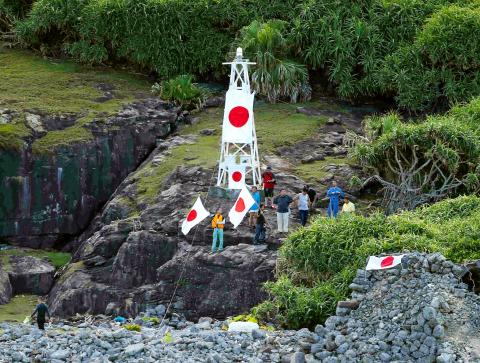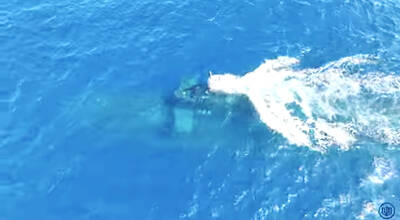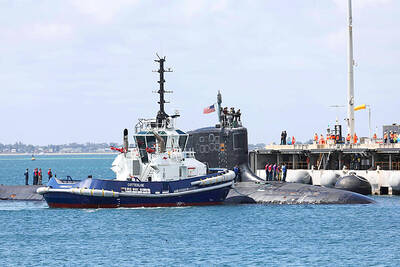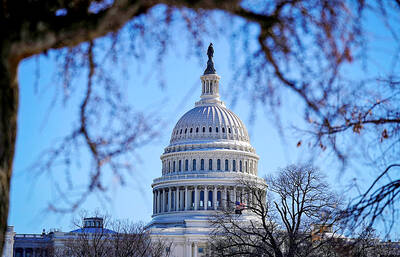Nationalists raised Japanese flags on an island at the heart of a corrosive territorial row with China yesterday, in a move likely to further inflame tensions with Beijing.
About a dozen members of the right-wing group Gambare Nippon (“Hang In There, Japan”) swam ashore, an Agence France-Presse (AFP) journalist witnessed, from a 20-boat flotilla carrying activists and lawmakers.
The landing comes just days after Tokyo deported pro-Beijing protesters who had landed on the island, part of a chain administered by Japan, but claimed by China, which had warned against acts “harming” its territorial sovereignty.

Photo: AFP
Tokyo politician Eiji Kosaka, one of the men who made it to the island, said the group had planted Japanese flags on a hillside and on the shore.
“This is undoubtedly Japanese territory,” he told an AFP reporter aboard the flotilla on his return. “On the mountain we found [the ruins of] Japanese-style houses that had places for drying fish.”
“It is very sad that the Japanese government is doing nothing with these islands,” he said, adding that the nationalists’ expedition had been “a great success.”
The 150 people who had made the voyage, including eight parliamentarians, sailed back to far southwestern Ishigaki yesterday. They had spent about five hours at the islands, known as the Senkaku Islands in Japan and the Diaoyutai Islands (釣魚台) in Taiwan.
Japanese Coast Guard ships had urged the activists not to land, with officers boarding some of the vessels to question people. No arrests were made.
China reacted with vehemence.
“Japanese right-wingers illegally violated China’s territorial sovereignty,” a statement quoted foreign ministry spokesman Qin Gang (秦剛) as saying. “The foreign ministry has already lodged solemn representations and expressed strong protest to the Japanese embassy in China and urged Japan to stop actions which harm China’s territorial sovereignty.”
Before the voyage, Kenichi Kojima, a local politician from Kanagawa, near Tokyo, said the trip was about who owned the archipelago, whose seabed is believed to harbor rich mineral resources.
“I want to show the international community that these islands are ours. It is Japan’s future at stake,” he said.
Organizers, who had been refused permission by Tokyo to go ashore, said ahead of their departure that they would be holding a ceremony aboard boats to remember some of those who died in World War II.
In Tokyo, Japanese Vice Foreign Minister Tsuyoshi Yamaguchi said established practice was for only government officials to land there.
However, he added: “In principle, it is alright for Japanese people to visit Japanese territory.”
The dispute over the islands is one of the major stumbling blocks — along with issues related to Japan’s military occupation of parts of China during World War II — to smooth relations between Asia’s two giant economies.
Tensions spiked as Japan deported 14 pro-China activists who sailed to the islands from Hong Kong.
Some managed to land on Uotsurijima, the largest island, becoming the first non-Japanese to set foot on any part of the archipelago since 2004.

CSBC Corp, Taiwan (台灣國際造船) yesterday released the first video documenting the submerged sea trials of Taiwan’s indigenous defense submarine prototype, the Hai Kun (海鯤), or Narwhal, showing underwater navigation and the launch of countermeasures. The footage shows the vessel’s first dive, steering and control system tests, and the raising and lowering of the periscope and antenna masts. It offered a rare look at the progress in the submarine’s sea acceptance tests. The Hai Kun carried out its first shallow-water diving trial late last month and has since completed four submerged tests, CSBC said. The newly released video compiles images recorded from Jan. 29 to

DETERRENCE EFFORTS: Washington and partners hope demonstrations of force would convince Beijing that military action against Taiwan would carry high costs The US is considering using HMAS Stirling in Western Australia as a forward base to strengthen its naval posture in a potential conflict with China, particularly over Taiwan, the Wall Street Journal reported on Saturday. As part of its Indo-Pacific strategy, Washington plans to deploy up to four nuclear-powered submarines at Stirling starting in 2027, providing a base near potential hot spots such as Taiwan and the South China Sea. The move also aims to enhance military integration with Pacific allies under the Australia-UK-US trilateral security partnership, the report said. Currently, US submarines operate from Guam, but the island could

RESTRAINTS: Should China’s actions pose any threat to Taiwan’s security, economic or social systems, China would be excluded from major financial institutions, the bill says The US House of Representatives on Monday passed the PROTECT Taiwan Act, which states that Washington would exclude China from participating in major global financial organizations if its actions directly threaten Taiwan’s security. The bill, proposed by Republican Representative Frank Lucas, passed with 395 votes in favor and two against. It stipulates that if China’s actions pose any threat to Taiwan’s security, economic or social systems, the US would, “to the maximum extent practicable,” exclude Beijing from international financial institutions, including the G20, the Bank for International Settlements and the Financial Stability Board. The bill makes it clear that China must be prepared

Taiwanese trade negotiators told Washington that Taipei would not relocate 40 percent of its semiconductor production to the US, and that its most advanced technologies would remain in the nation, Vice Premier Cheng Li-chiun (鄭麗君) said on Sunday. “I told the US side very clearly — that’s impossible,” Cheng, who led the negotiation team, said in an interview that aired on Sunday night on Chinese Television System. Cheng was referring to remarks last month by US Secretary of Commerce Howard Lutnick, in which he said his goal was to bring 40 percent of Taiwan’s chip supply chain to the US Taiwan’s almost